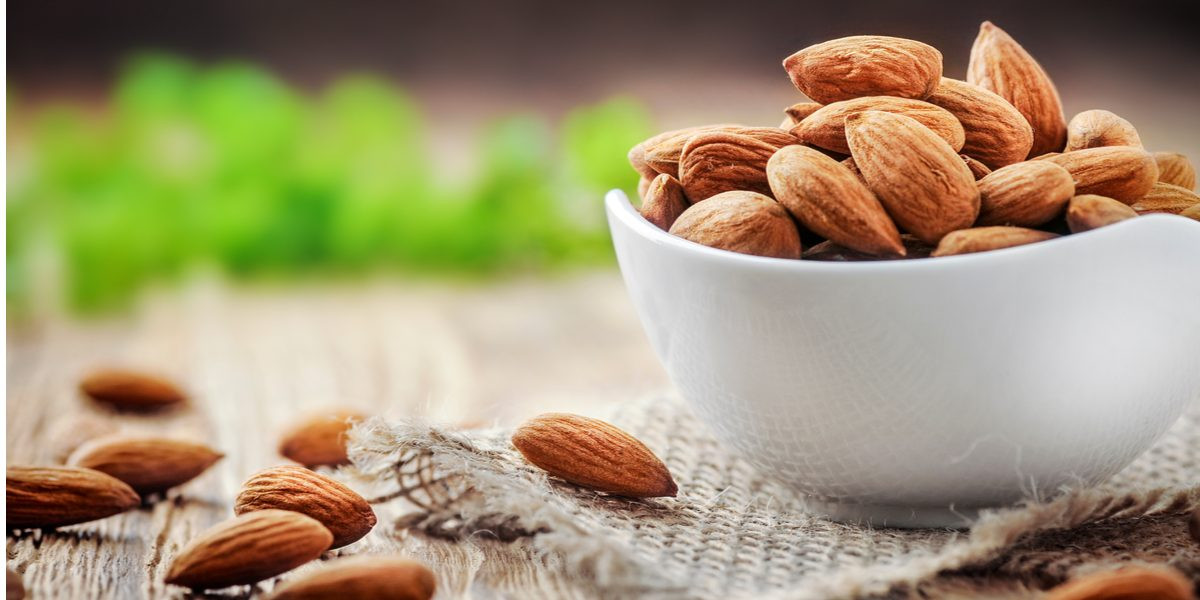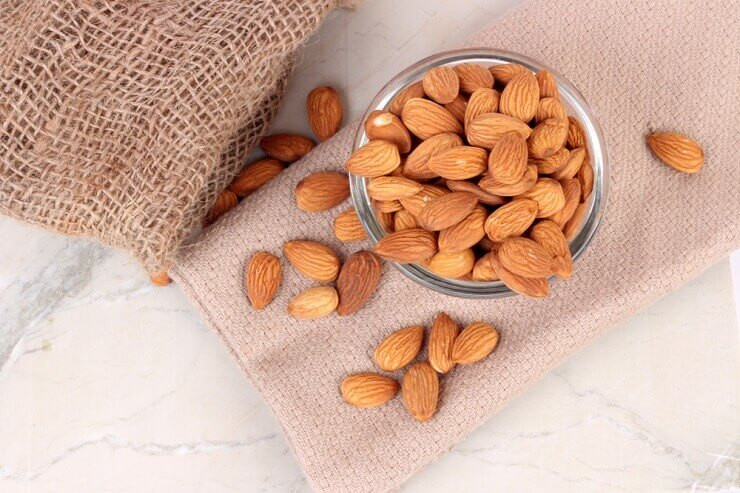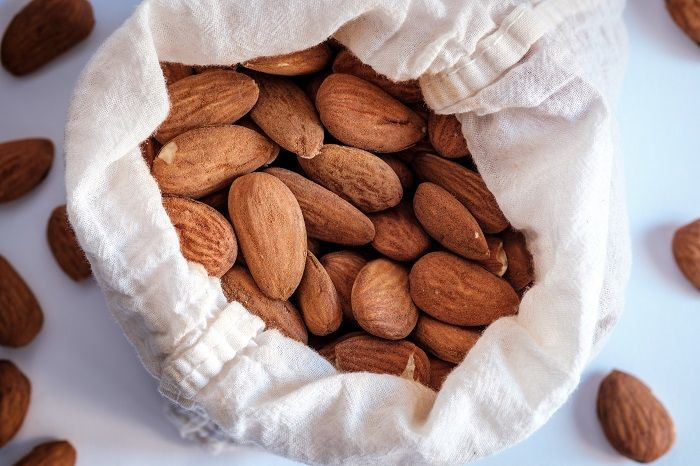Are Almonds Harmful To Cats? Yes, almonds can be harmful to cats. While sweet almonds aren’t toxic, they pose several risks, including digestive upset, choking hazards, and potential for pancreatitis. Solcat.net is dedicated to providing cat owners with reliable information about feline health and nutrition. Discover the potential dangers and safer alternatives to keep your feline friend healthy and happy, plus learn about balanced diets and specialized feline care.
1. Understanding the Risks: Are Almonds Really Safe for Your Cat?
Are almonds harmful to cats? The answer is more nuanced than a simple yes or no. While almonds aren’t considered acutely toxic to cats, they aren’t a particularly safe or beneficial treat for your feline companion. Here’s a detailed look at why:
- Digestive Issues: Cats’ digestive systems are designed to process animal protein. Almonds, being high in fat and fiber, can be difficult for cats to digest, leading to vomiting, diarrhea, and abdominal discomfort.
- Choking Hazard: The size and shape of almonds make them a potential choking hazard, especially for smaller cats or kittens.
- Pancreatitis Risk: The high fat content in almonds can trigger pancreatitis, a painful and potentially life-threatening inflammation of the pancreas.
- Nutritional Imbalance: Cats are obligate carnivores, meaning they require a diet primarily composed of animal protein. Almonds offer little nutritional value to cats and can disrupt the balance of their diet.
 Close-up of an almond, a common nut
Close-up of an almond, a common nut
Almonds, while nutritious for humans, pose several health risks to cats due to their digestive systems being primarily designed for animal protein.
2. The ASPCA and Almonds: What You Need to Know
According to the American Society for the Prevention of Cruelty to Animals (ASPCA), sweet almonds are not considered toxic to cats. However, the ASPCA also emphasizes that almonds can cause gastrointestinal upset in cats. It’s important to remember that “non-toxic” doesn’t necessarily mean “safe” or “beneficial.”
3. Sweet Almonds vs. Bitter Almonds: A Critical Distinction
It’s crucial to distinguish between sweet almonds (the kind typically sold in supermarkets) and bitter almonds. Bitter almonds contain cyanogenic glycosides, which can release cyanide, a highly toxic substance. While bitter almonds are rarely sold for consumption in the United States, it’s essential to be aware of the potential danger. If you suspect your cat has ingested bitter almonds, seek immediate veterinary attention.
4. Decoding Pet Food Labels: Are Almonds Lurking in Your Cat’s Food?
Do almonds have a place in commercial cat food? Typically, no. Cat food manufacturers prioritize ingredients that align with a cat’s natural dietary needs, focusing on meat-based proteins and essential nutrients. Plant-based ingredients like sweet potatoes, pumpkin, cranberries, or blueberries are more commonly found in cat food than nuts. These ingredients provide fiber and other nutrients without the risks associated with almonds.
5. Symptoms to Watch For: What Happens if Your Cat Eats Almonds?
If your cat manages to sneak a few almonds, it’s essential to monitor them for any signs of digestive upset. Common symptoms include:
- Vomiting
- Diarrhea
- Loss of appetite
- Lethargy
- Abdominal pain
If your cat exhibits any of these symptoms, contact your veterinarian.
6. Almond Milk and Almond Butter: Safer Alternatives?
What about almond milk and almond butter? Are they safer alternatives to whole almonds? While almond milk might be easier for cats to digest than whole almonds, it still lacks the essential nutrients that cats need. Additionally, some commercial almond milk products contain additives that could be harmful to cats.
Almond butter, like whole almonds, is high in fat and can cause digestive upset or pancreatitis. Neither almond milk nor almond butter is a recommended treat for cats.
7. Debunking Myths: Are Almonds a Good Source of Protein for Cats?
One common misconception is that almonds are a good source of protein for cats. While almonds do contain protein, it’s not the type of protein that cats need. Cats require animal protein, which contains essential amino acids that are not found in plant-based proteins like almonds. Relying on almonds as a protein source can lead to nutritional deficiencies in cats.
8. Exploring Feline Taste Preferences: Do Cats Even Like Almonds?
Cats are obligate carnivores, meaning their taste preferences are geared towards meat. While some cats might be curious about the smell or texture of almonds, it’s unlikely that they would find them particularly appealing. Offering almonds to your cat is unlikely to provide any enjoyment and could potentially cause digestive problems.
9. Safer Treat Options: What Can You Give Your Cat Instead of Almonds?
If you’re looking for healthy and safe treats for your cat, there are plenty of better options than almonds. Consider these alternatives:
- Commercial Cat Treats: Choose treats that are specifically formulated for cats and made with high-quality ingredients.
- Cooked Chicken or Turkey: Small pieces of plain, cooked chicken or turkey can be a healthy and delicious treat for cats.
- Cooked Fish: Cooked fish, such as salmon or tuna, is another good source of protein for cats. Be sure to remove all bones before offering it to your cat.
- Catnip: Catnip is a safe and enjoyable treat for most cats. It can be given fresh, dried, or as part of a toy.
10. Protecting Your Feline Friend: How to Prevent Almond Ingestion
The best way to protect your cat from the potential dangers of almonds is to keep them out of reach. Store almonds and other nuts in airtight containers in a location that your cat cannot access. Be mindful of leaving almonds out on counters or tables, and clean up any spills immediately.
11. Understanding Cat Nutrition: A Carnivore’s Diet
Cats are obligate carnivores, and their dietary needs are very different from those of humans. A cat’s diet should be primarily composed of animal protein, with moderate amounts of fat and minimal carbohydrates. It’s essential to choose a high-quality cat food that meets these requirements.
12. Nutritional Needs: What Nutrients Do Cats Require?
What nutrients do cats need to thrive? Cats require a variety of essential nutrients, including:
- Protein: Animal protein is essential for building and repairing tissues, supporting immune function, and providing energy.
- Fat: Fat provides energy, supports healthy skin and coat, and helps with the absorption of fat-soluble vitamins.
- Vitamins: Cats need a variety of vitamins, including vitamin A, vitamin D, vitamin E, and B vitamins, to support various bodily functions.
- Minerals: Minerals, such as calcium, phosphorus, and potassium, are essential for bone health, nerve function, and muscle function.
- Water: Water is essential for hydration and plays a role in many bodily processes.
13. The Role of Taurine: Why It’s Essential for Cats
Taurine is an essential amino acid that is only found in animal protein. Cats cannot synthesize taurine on their own, so they must obtain it from their diet. Taurine is crucial for vision, heart function, digestion, and reproduction. A taurine deficiency can lead to serious health problems in cats.
14. Consulting Your Veterinarian: The Best Source of Information
If you have any questions or concerns about your cat’s diet or health, it’s always best to consult with your veterinarian. Your veterinarian can provide personalized advice based on your cat’s individual needs and health status.
15. Homemade Cat Food: Is It a Good Idea?
While it’s possible to make your own cat food at home, it’s essential to do so under the guidance of a veterinarian or a veterinary nutritionist. Homemade cat food must be carefully formulated to meet all of a cat’s nutritional needs. An improperly balanced homemade diet can lead to serious health problems.
16. Understanding Feline Digestion: A Unique System
Cats have a relatively short digestive tract compared to humans, which is adapted for processing animal protein. Their digestive enzymes are specifically designed to break down meat and fat. Plant-based foods, like almonds, are more difficult for cats to digest and can cause digestive upset.
17. Exploring Commercial Cat Food Options: What to Look For
Choosing the right commercial cat food can be overwhelming, given the many options available. Look for cat foods that:
- List meat as the first ingredient
- Are formulated to meet the nutritional needs of cats
- Are free of artificial colors, flavors, and preservatives
- Have been tested by the Association of American Feed Control Officials (AAFCO)
18. Age-Specific Nutrition: Feeding Kittens, Adults, and Seniors
A cat’s nutritional needs change throughout its life. Kittens require a diet that is high in protein and calories to support growth and development. Adult cats need a balanced diet to maintain their health and weight. Senior cats may require a diet that is lower in calories and higher in fiber to support digestive health.
19. Weight Management: Keeping Your Cat at a Healthy Weight
Maintaining a healthy weight is essential for a cat’s overall health and well-being. Overweight cats are at increased risk for diabetes, arthritis, heart disease, and other health problems. Work with your veterinarian to determine your cat’s ideal weight and develop a weight management plan if necessary.
20. Hydration: Ensuring Your Cat Drinks Enough Water
Water is essential for cats, just as it is for all living creatures. Cats can be prone to dehydration, so it’s important to make sure they have access to fresh, clean water at all times. You can also encourage your cat to drink more water by offering wet food or using a water fountain.
21. Dental Health: Choosing Foods That Promote Healthy Teeth
Dental health is an important aspect of overall feline health. Choose cat foods and treats that are specifically designed to promote healthy teeth. Dry food can help to scrape away plaque and tartar, while dental treats can help to freshen breath and reduce bacteria in the mouth.
22. Food Allergies and Sensitivities: Identifying Potential Triggers
Food allergies and sensitivities can cause a variety of symptoms in cats, including skin problems, digestive upset, and respiratory issues. Common food allergens in cats include beef, dairy, fish, and chicken. If you suspect your cat has a food allergy or sensitivity, work with your veterinarian to identify the trigger and develop an appropriate diet.
23. The Importance of Fiber: Supporting Digestive Health
Fiber plays an important role in supporting digestive health in cats. Fiber can help to regulate bowel movements, prevent constipation, and promote a healthy gut microbiome. Some cat foods contain added fiber, such as beet pulp or cellulose.
24. Understanding Feline Behavior: Why Do Cats Eat What They Do?
Understanding feline behavior can help you to make informed decisions about your cat’s diet. Cats are naturally curious and may be tempted to try new foods. However, it’s important to remember that not all foods are safe for cats. By providing your cat with a healthy and balanced diet, you can help to prevent them from seeking out unsafe foods.
25. The Role of Antioxidants: Protecting Against Cell Damage
Antioxidants are substances that help to protect cells from damage caused by free radicals. Free radicals are unstable molecules that can contribute to aging and disease. Some cat foods contain added antioxidants, such as vitamin E and vitamin C.
26. Probiotics and Prebiotics: Supporting Gut Health
Probiotics are live microorganisms that can help to improve gut health. Prebiotics are non-digestible fibers that feed beneficial bacteria in the gut. Some cat foods contain added probiotics and prebiotics.
27. The Impact of Processing: Choosing Minimally Processed Foods
Minimally processed cat foods are generally considered to be healthier than highly processed foods. Minimally processed foods retain more of their natural nutrients and are less likely to contain artificial additives.
28. Ethical Considerations: Choosing Sustainable Cat Food
As pet owners, we have a responsibility to choose cat foods that are produced in an ethical and sustainable manner. Look for cat foods that are made with sustainably sourced ingredients and that are packaged in eco-friendly materials.
29. The Future of Feline Nutrition: What’s on the Horizon?
The field of feline nutrition is constantly evolving. Researchers are continually learning more about the nutritional needs of cats and developing new and innovative cat foods. Stay informed about the latest developments in feline nutrition by consulting with your veterinarian and reading reputable sources of information.
30. Solcat.net: Your Trusted Resource for Feline Information
Solcat.net is committed to providing cat owners with accurate, reliable, and up-to-date information about feline health and nutrition. We believe that informed pet owners are better equipped to provide their cats with the best possible care. Visit Solcat.net to learn more about cat nutrition, behavior, health, and more.
Address: 950 Alaskan Way, Seattle, WA 98104, United States.
Phone: +1 (206) 386-4000.
Website: solcat.net.
31. Key Takeaways: Are Almonds Harmful to Cats?
- Almonds are not toxic to cats, but they are not a safe or beneficial treat.
- Almonds can cause digestive upset, choking, and pancreatitis in cats.
- Cats are obligate carnivores and require a diet primarily composed of animal protein.
- There are plenty of safer and healthier treat options for cats.
- Consult with your veterinarian about your cat’s diet and health.
 bowl of almonds for cats
bowl of almonds for cats
A bowl of almonds can be tempting, but these are far from ideal for cats, who require animal-based protein and fats over plant-based alternatives.
32. Expanding Your Feline Knowledge: Further Reading
To further expand your understanding of feline nutrition and health, consider exploring the following resources:
- Cornell Feline Health Center: The Cornell Feline Health Center is a leading source of information about feline health and well-being.
- American Animal Hospital Association (AAHA): The AAHA provides resources for pet owners, including information about pet health, nutrition, and behavior.
- Your Veterinarian: Your veterinarian is the best source of personalized advice about your cat’s health and nutrition.
33. Top Search Intentions
Here are 5 top search intentions related to the keyword “are almonds harmful to cats”:
- Informational: Users want to know if almonds are toxic or pose any health risks to cats.
- Safety: Users are concerned about accidental ingestion and want to know what to do if their cat eats almonds.
- Alternatives: Users are looking for safer treat options for their cats.
- Symptoms: Users want to identify potential signs of almond poisoning or digestive upset in cats.
- Nutritional Advice: Users want to understand the appropriate diet for cats and whether almonds fit into that diet.
34. FAQ: Common Questions About Cats and Almonds
34.1. What happens if a cat eats almonds?
Sweet almonds are non-toxic, so one or two shouldn’t cause major harm, but digestive upset is possible. Too many can cause vomiting and diarrhea. Bitter almonds are highly toxic and require immediate vet attention.
34.2. What nuts are poisonous to cats?
Macadamia nuts are poisonous to cats. Other nuts like almonds, pecans, walnuts, and peanuts can cause vomiting and diarrhea due to their high fat content.
34.3. Can cats eat sweet almonds?
Sweet almonds aren’t severely toxic, but their fat content and indigestibility can cause vomiting, diarrhea, and pancreatitis. They also pose a choking hazard and potential for intestinal obstruction.
34.4. Can cats eat any nuts?
Nuts are generally high in fat, which can upset a cat’s digestive system. Safer alternatives include small amounts of cooked chicken, turkey, or white fish.
34.5. Are almonds a good source of protein for cats?
No, almonds are not a suitable protein source for cats. Cats need animal protein to get essential amino acids that plant-based proteins lack.
34.6. Is almond milk safe for cats?
Almond milk is not toxic but provides little nutritional value to cats. It’s preferable to cow’s milk (due to lactose intolerance) but should not be a regular part of a cat’s diet.
34.7. What are the symptoms of almond poisoning in cats?
Symptoms include vomiting, diarrhea, loss of appetite, lethargy, and abdominal pain. Bitter almond poisoning can cause more severe symptoms, including seizures and respiratory distress.
34.8. How can I prevent my cat from eating almonds?
Store almonds in airtight containers out of your cat’s reach. Avoid leaving almonds on counters or tables and clean up any spills immediately.
34.9. What is the best diet for a cat?
A cat’s diet should be primarily composed of animal protein, with moderate amounts of fat and minimal carbohydrates. Choose a high-quality cat food that meets these requirements.
34.10. When should I consult a veterinarian about my cat’s diet?
Consult your veterinarian if you have any questions or concerns about your cat’s diet or health, especially if your cat has underlying health conditions or dietary sensitivities.
 Almond inside a cotton sack
Almond inside a cotton sack
Although almonds are a source of nutrients for humans, cats can suffer complications when consuming them, so it’s better to avoid feeding them to our feline friends.
35. Call to Action
Want to learn more about keeping your feline friend happy and healthy? Visit solcat.net today for articles, tips, and a supportive community of cat lovers! Explore our comprehensive guides on feline nutrition, behavior, and health, and connect with other cat owners in the USA. Let’s create a better world for our feline companions together! Solcat.net: Your ultimate destination for everything cat-related.
